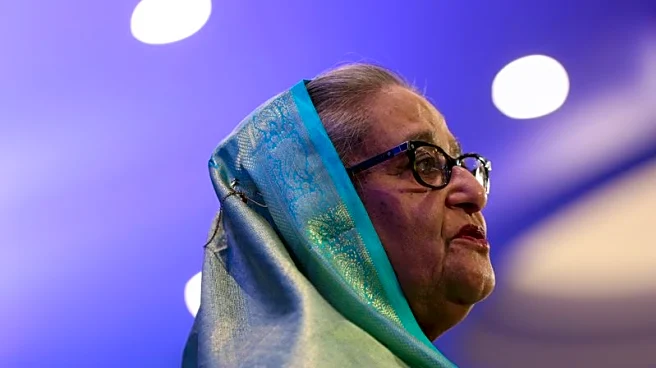(Reuters) -A Bangladesh court sentenced ousted Prime Minister Sheikh Hasina to death on Monday, concluding a months-long trial that found her guilty of ordering a deadly crackdown on a student-led uprising
last year.
The Muslim-majority South Asian country of 170 million people has grappled with instability since Hasina fled to India in August 2024 at the height of the uprising. Here are the key events:
DEADLY JULY PROTESTS
Protesters led by the 'Students Against Discrimination' group initially wanted quotas in public sector jobs but the movement escalated in July 2024 as they demanded Hasina's resignation and clashed with security forces and supporters of her Awami League party.
Protesters blamed the government for a crackdown that killed hundreds of people and injured thousands with unrest peaking on August 5 when Hasina was forced to flee to neighbouring India just before crowds stormed her official residence. She has stayed since in the Indian capital New Delhi.
YUNUS TAKES CHARGE
An interim government was formed and tasked with restoring stability and preparing for parliamentary elections. Nobel laureate Muhammad Yunus, 85, took charge as de facto prime minister. Elections will be held in early February, he has said.
The interim government promised sweeping institutional reforms but progress has been slow and fragmented, despite broad consensus on key reforms such as restoring a non-partisan caretaker government to oversee elections, depoliticising state institutions and overhauling the Election Commission.
But deeper reforms have stalled in the face of sharp disagreements between political parties over proposals for constitutional change, judicial reform and introduction of a bicameral parliament. Political analysts have pointed to a widening gap between public expectations and outcomes.
ELECTION, INCLUSION AND CONTENTION
Yunus' government is caught between the need for reform and pressure for early elections, its biggest challenge.
Further strain has been added by the controversy over the exclusion of Hasina's Awami League party, after its registration was suspended, effectively barring it from contesting.
Many want it to participate, despite its top leadership being prosecuted for alleged violations of human rights during the protests. Without broad political inclusion, the legitimacy of a vote could be suspect.
The newly formed National Citizen Party (NCP), born out of the 2024 protests, is viewed by critics as being favoured by Yunus' administration, which the government denies. But the suspicion could also cloud the credibility of the vote.
CHANGED POLITICAL CULTURE, BUT FRAGILE GAINS
Law enforcement remains a challenge. Political violence, mob attacks and harassment of journalists and minorities, especially women, are regularly reported. Mob violence claimed at least 261 lives between August 2024 and October 2025, says rights group Ain o Salish Kendra.
New York-based Human Rights Watch warns that while some authoritarian practices have ended, the interim government has adopted troubling tactics of its own.
Among these are arbitrary detentions, mass arrests, and politically motivated prosecutions mostly targeted at supporters of Hasina's party, the group said.
Torture in custody and use of the Special Powers Act continue, mirroring repressive tactics of the past, HRW said.
The interim government denies the charges.
JULY DECLARATION
A charter called the 'July Declaration' after last year's uprising has laid out the roadmap for democratic reforms.
Last week, Yunus said the interim government will hold a national referendum alongside the February parliamentary vote on implementing the charter for state reform, saying it will be implemented depending on the outcome of the referendum.
The charter will eventually become a part of the constitution if approved by the new parliament.
The July Charter seeks to reshape the country's politics and institutions and give constitutional recognition to the 2024 uprising. It envisages increased representation of women, limiting the prime minister’s term, strengthening presidential powers, expanding fundamental rights and ensuring judicial independence.
(Reporting by Ruma Paul; Editing by Shilpa Jamkhandikar and Raju Gopalakrishnan)










